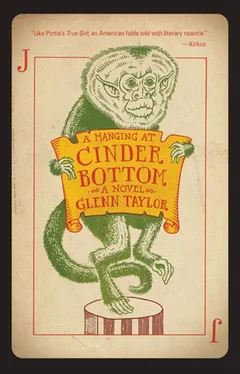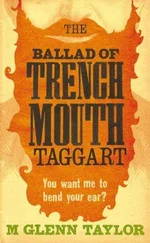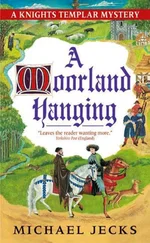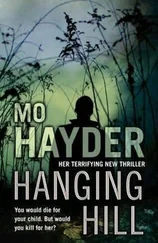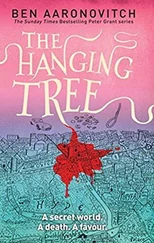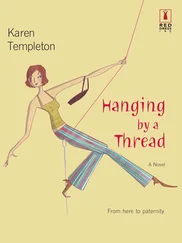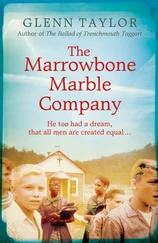Ten yards off, the driver cut his wheel and mashed his brake pedal. The white spokes of his wheels seemed nearly to bend. The gold-gilded headlamps and grill flashed like a smile, and cut grass spat on the tablecloth.
“Good Lord in Heaven,” Trent said. He’d tripped on his chair and hit the ground.
The slick-haired man cut the engine and stepped from his seat. He was sixty years old but had the frame of a man much younger. He wore no hat. He smiled and breathed in deep through his nose. “Ah,” he said. “That is real air.”
Tony Thumbs emerged slow, his old joints sticking. He made a beeline for the evergreens to relieve his troubled bladder. Baz rode on his shoulder bone.
When he’d finished his dramatic inhalations, the driver stepped toward the stunned lot of standing men. He thrust out his big hand. “Phil,” he said. “Pleasure.” He shook the hand of Rufus first, then Harold, then Al.
Last was Henry Trent, who rubbed at his newly injured hip. He narrowed his eyes. He said, “You’re the man we’ve heard so much on but never yet seen.”
“Well, here I am,” the man said, “and Master John Goodfellow has already found lodging in the parlor of sweet Rose Cantu.” He situated his groin. “And she is still bright as sunshine and as pure as dew.”
Harold Beavers only frowned.
It was quiet for only a moment before Phil made a declaration. “I’ve got a case of rye whiskey in the rumble trunk.” He turned and walked brisk to procure it. He was having the time of his life already. Playing Chicago Phil on a West Virginia mountain was a welcome departure for him, a man who’d spent most of his acting life soliloquizing Shakespeare in the decrepit Old Drury. “Who’s thirsty?” he shouted.
Abe smiled. Tony Thumbs had been right again. The man introducing himself as Chicago Phil was a veritable ham. Jim Fort was his true name. Telling big-money lies was his momentary game.
Harold Beavers liked rye. He watched the man procure it from the rack. He regarded the vehicle. “That is some automobile,” he said.
“Chambers-Detroit,” Phil said. “Touring.”
“What’s your top speed?”
“Thirty-eight miles per hour.” His smile widened. He set the case on the table. He pried it open with a bowie knife he wore on his hip.
“You have a last name?” Rufus asked.
Phil gave no reply, but instead uncorked the rye. He drank from the bottle and handed it to Harold. “Yes,” he said, “there is ample legroom in the touring. I won that pretty thing at a basement game in Cincinnati. She’s worth thirty-five hundred new.”
Now Tony Thumbs stepped from the trees and went to each man, his hand extended in greeting. “Not to worry,” he said. “Didn’t spill a drop on it.” Baz bobbed his head and offered his own little hand for the shaking.
Harold did not accept. “Hell zounds,” he said. “Carnival come to town.” He took a second snort from the bottle and passed it to Abe.
Tony Thumbs looked square at Trent as he shook his hand and said, “Pleasure. I’ve met your chief of police and admired his gumption.”
Trent nodded.
“Wonderful town you’ve got here. Wide open.” Tony was careful not to lay it on too thick. “Couldn’t stay away. Those Cinder Bottom girls can stiffen up even the shriveled old-stagers like me.” He winked at Harold Beavers, who gave no expression in return. Tony went on. “Max and Beatrice are all lined up. I’ve just finalized their arrangements on Tuesday. They’ll arrive on the fourth, five PM train.”
“Good,” Trent said.
The rye made its way around with all but Al imbibing. He’d limped off to fetch two more chairs.
“You say you won that vehicle?” Harold was fond of the particular burn of this strange rye whiskey. He poured it in his coffee mug generously.
Phil smiled. “I had kings full of fours,” he said. He noted the children as they peeked from behind a window curtain. He cleared his throat. “I gather from Abe that all of you gentlemen are aces at the table.” He looked to Rufus. Then Trent. “I gather too that the Oak Slab is the finest and most-established game in a hundred miles or more.”
Trent said, “Thirteen years that game has run without stoppage.”
Phil whistled his admiration and clasped his hands on the table. “I’d sure like to sit and play when I finish at the Baaches.”
“You ever play any cards in south Florida?” Harold asked.
“Well, sure. And on top of it, I won my first clean grand in Bay Biscayne.”
“Is that right?”
“Yes sir. That was back when I still kept my monies in a bank, fool as I was.” He laughed. He noted the Beavers’ nod of approval. “Anyway, back then I’d been depositing my table winnings at this fancy bank on Flagler Street, a hundred or more dollars a day, every day, for a number of months, and one particular Friday, as I was leaving, the bank president asked for a word. He was a small, sickly man, but his office was beautiful. Had a chandelier in there I’d still like to get my hands on.”
The men listened.
“So we sit down and he asks me how it is I’m able to deposit like I do — wants to know what line of work I’m in. So I tell him. I’m a professional gambler. He says to me, ‘Don’t gamblers lose now and then?’ I said they didn’t if they knew their business. He said, ‘No man knows his business that well.’ I said I’d prove to him that I never lost a bet. I said I’d bet him right then and there two hundred dollars that at noon the next day, I’d come back to his beautiful banker’s office, and his balls would be spiked all over, like sweetgum seeds.”
Each man laughed then. Abe especially enjoyed the tale, as he’d been the one who told a version of it originally on a late saloon night. Jim Fort had been tickled by the story, asked if he might use it in his role as Chicago Phil. “By all means,” Abe had told him.
Phil went on. “So the banker, a real square paper, he can’t pass up what he knows is impossible, so he says, ‘You’re on,’ and shakes my hand.” Now he had them hooked. He was talking fast enough to keep them on the line and slow enough not to lose them. “Next day, I go back. Accompanying me is the richest son of a bitch in Miami at that time, a man who’d just as soon gamble on cockroach races and back-alley nickel pitches as he would a title fight. We step in the office and close the door and I tell the bank president to drop his trousers. He does so, red-faced, but content in the knowledge that his balls are round as they’d ever been. Still, he’s got to prove it, so I step over to where he’s standing half-naked under that big gleaming chandelier, and I reach over there between his puny thighs and cup those nuts in my hand, and the banker turns redder still, and across the room, the richest son of a bitch in Miami drops his head to his chest and takes out his billfold.”
The Beavers brothers just sat there a moment. Henry Trent too.
“I’d bet that rich son of a bitch twelve hundred dollars that on Saturday at noon, I’d have a bank president’s balls in my hand.”
They slapped the table and roared, Harold especially. It was one of the finest tales he’d heard.
They emptied the bottle and uncorked another.
At two o’clock, Tony laid on the table a bottle of beer, a cigarette, and a match. He said he’d bet any takers his monkey could open the beer, drink it down, light the match, and smoke the cigarette in less than two minutes. The Beavers brothers inspected the bottle, and indeed it was tight-sealed with the new variety of crown cap. They each laid down ten.
At the sound of Tony’s whistle, Baz leapt from his shoulder and bared his yellow teeth at the bottle. The men were startled by the length of his canines. His movements were newly quick. He used his middle incisors like a vice, tore off the cap and spat it in the grass, and, sealing his lips around the bottle’s neck, he pointed its bottom at the sky. His swallows were fast and consistent. It was empty in forty-nine seconds. He lit the match on his big toenail whilst already drawing on the butt. They’d not ever seen a body puff so swift, and when he’d finished he dropped it in the bottleneck hole.
Читать дальше
Конец ознакомительного отрывка
Купить книгу
